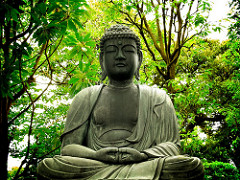Acceptance, according to Buddhist principles, is the belief in accepting what is. Accepting life as it comes. Accepting one’s responsibility and action. Accepting one’s personality and qualities, both positive and negative. It is a concept that embraces karma as well as fate. It is a way of going with what is rather than resist and become distressed with what is not. It means surrendering control and power to the unforeseeable forces of nature and the universal laws of cause and effect. It can be an unfamiliar and challenging notion to practice if you have strong precedence to control your life. To begin accepting what is means letting go of the locus of control. Letting go of what you think you have control of in your life.
 Acceptance is a concept of belief that recognises the validity of a thing or situation as it is. It is a conscious act with a positive intention for open-mindedness. It is to perceive something or a problem with a realistic view without judgement, assumption or supposition. In Psychology, acceptance is a catharsis, and it is a process of healing our cognition and emotion. But, if we can extend acceptance to all aspect of our lives and ourselves, we can come to a place of peace.
Acceptance is a concept of belief that recognises the validity of a thing or situation as it is. It is a conscious act with a positive intention for open-mindedness. It is to perceive something or a problem with a realistic view without judgement, assumption or supposition. In Psychology, acceptance is a catharsis, and it is a process of healing our cognition and emotion. But, if we can extend acceptance to all aspect of our lives and ourselves, we can come to a place of peace.
However, to accept something or someone, we need to understand ourselves implicitly. It means looking within to check our belief system, mindset, prejudices and judgement that we hold from our lived experiences. It is about observing our ethical and moral values. As social beings, humans are generally easily influenced, and our actions impact those around us. As we are influenced by others, we believe some of the things others say, especially those we idealised. As we accept those individuals, we are shaped by those in our environment in conformity. If something that we received differs from those we already believed, there will be an internal conflict. If we are stifled by others for our unique thinking, we may become a scapegoat or an outcast, which also causes inner dissonance.
 To be able to accept what is, here are a few tips that I have tried and tested. They are the tools and strategies that work for me over the years in training and practising as a therapist. They may seem like common sense, but sometimes the simplest things are most effective.
To be able to accept what is, here are a few tips that I have tried and tested. They are the tools and strategies that work for me over the years in training and practising as a therapist. They may seem like common sense, but sometimes the simplest things are most effective.
“The greatest gift of enlightenment to give to anyone is to share it.” – Buddha.
Here are some helpful tips to accepting what is
- Letting go of things (and people) that are unhelpful to you for the moment while you work through your processes and learning how to accept what is. This could mean walking away from a difficult situation without a resolution. It could also mean physically letting go of your attachment to those things and people, and you will need to be disciplined in sticking to your decision. I found it most challenging to let of an unhealthy friendship. Even with positive intention, you cannot control the reaction that will be present in the other when they feel rejected as you let go of the relationship.
- Recognise that you can change the thing that you can and cannot change the thing that you cannot. This is about realising what is within your control and boundary. You can change your behaviours and your actions, but you cannot change those in others.
- Acknowledge the loss of letting go. When you consciously acknowledge something, you have an understanding of it happening, even if you have a belief around it. You might believe that you needed some space to work through an emotional reaction to something that a friend has said. As you let go of the relationship to process your response, you will experience a loss. The loss needs to be processed, and by giving yourself time, you are working through forgiving your grief.
- Find your pleasure and soothe yourself in the learning process and in the grief. We often take self-care for granted, but it is now one of my favourites. Finding what makes you happy and joyous is a way to appreciate ourselves. You can easily build a self-care ritual into your daily routine. The trick is to find that joy. In the learning process, you can explore what makes you smile. In the grieving process, you can find what will comfort those tears. In the anxieties of facing the unresolved situation, you might discover that mindfulness help. Use your inner healer or go on an inner vacation with these meditations.
- See, feel and know that it is not personal. Set your intentions to honestly look at the situation. Feel and experience the tension so that you can learn from it. Acknowledge what happened has a reason, even if this reasoning is not yet clear to you. Even if you suspect ill-intention from others, you can say to yourself internally that this too shall pass. You cannot change the way other feels. You can only change your perception.
- Adopt a self-forgiveness policy. Forgiveness is a process or action that pardon someone, something or ourselves. It can be difficult, but with practice, you can learn it too. Forgiveness is about removing the blame from the other, including yourself. It is about having compassion for your action, response and those of others too. Forgiveness works well with love and understanding in conjunction with a compassionate mind.
- Surrender. When you stop resisting, you will become receptive to the situation, a thing and people. To surrender means to let go and submit to what is. This is not the same as giving up, however. When you surrender to what is, you are opening up to spirituality and faith. This is a soulful experience of relinquishing control and trusting in life and the universe. The intention is to release the embodied experience and free the spirit to the constraint of the existential dilemma. It is similar to letting to, but you are doing it at the soul level. Try meditation and work on developing trust.
 Accepting what is is a personal challenge that I sometimes struggle with because mistakes happen in the reality of a situation, especially in a relationship. It is an ongoing process, and one should not place emphasis on achieving and then forgetting it. It is not about ticking the box, and you are done with it. But, the more you practice and adopt this way of being, the more familiar you will become with accepting things, situation, people, life and yourself.
Accepting what is is a personal challenge that I sometimes struggle with because mistakes happen in the reality of a situation, especially in a relationship. It is an ongoing process, and one should not place emphasis on achieving and then forgetting it. It is not about ticking the box, and you are done with it. But, the more you practice and adopt this way of being, the more familiar you will become with accepting things, situation, people, life and yourself.
“Peace comes from within. Do not resist it.” – Buddha.
Do you find this blog helpful? If you like this post, I love to hear from you on my Twitter Page.

